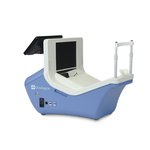



Bothwell Regional Health Center CEO Lori Wightman thrives on her curiosity and gathering information in all forms -- magazines, newspapers, online sources and in her relationships. As an original subscriber of Fast Company, a magazine launched in 1995 with a “focus on innovation in technology, leadership, world-changing ideas, creativity, and design,” Wightman read an article last fall about a new way to assess people who have suffered concussions.
In the article, Dr. Rosina Samadani and Dr. Uzma Samadani were named to the magazine’s annual list of most creative people in business. The sisters are CEO and founder, respectively, of Oculogica, an eye-tracking-based neuro-diagnostic company that has developed the first baseline-free tool in diagnosing concussions to help physicians objectively evaluate patients.
“The story on the technology was relatively short,” Wightman said. “But it piqued my interest because concussions are currently diagnosed subjectively and may not show up on CT or MRI scans. The method is legitimately researched and it is the only FDA-approved tool that objectively — no questions about it — assesses concussions. I was also fascinated by the fact they were sisters working together, so we reached out to start a conversation.”
Called the EyeBOX, the tool was conceived by Uzma Samadani, a neurosurgeon and brain-injury researcher, when she was looking for ways to assess her brain-injured patients. She began researching whether tracking eye movements could detect and quantify the severity of a concussive brain injury.
“Many inventions are serendipitous; oftentimes you’re looking for something and find something else,” said Rosina Samadani. “Uzma already knew the connection between cranial nerves and eye movement, but then she saw the connection of eye movement to concussions, and the EyeBOX was born.”
Uzma published her research, patented the methodology and created Oculogica in 2013. Early investors were friends and family. She began a two-year national search for someone to lead the company, and it turned out the right person was closer than expected. In 2015, Rosina, who holds a doctoral degree in biomedical engineering, has been a management consultant and led other health care technology startups, became the company’s first CEO.
“I have management and health care experience and had been giving Uzma advice on the business,” she said. “For her birthday, I gave her a briefcase and inside was a business plan. She was so happy.”
Rosina said they didn’t immediately agree she should become Oculogica’s CEO and the two had many discussions over three days about whether or not it was a good idea.
“We have a wonderful relationship but had never worked together before,” she said. “I also love her son and our other nieces and nephews, and I didn’t want to risk losing that. We talked seriously about what would happen if things went wrong and made sure we were going into it with our eyes wide open.”
The sisters grew up in rural Wisconsin, first in Cambria, population 600, and then Beaver Dam, which has about 15,000 people. Their father was a family physician for 50 years, and their mother was accepted to medical school but decided not to attend once she married and began a family. Rosina said both of their parents were influential in her and Uzma’s career paths.
“As a physician, my dad was obviously very interested in medicine, and he was always tinkering and thinking about new ways to do things,” she said. “He enjoyed new technologies, too; we were early adopters of everything, which I think inspired my entrepreneurial side. And my mother has an interest in medicine and is a huge advocate of getting girls educated.”
One of the sisters’ favorite stories demonstrates the effect of their mother’s influence and of their educational and career choices.
“Uzma’s son was asked if he wanted to be a neurosurgeon when he grew up,” Rosina said. “He answered, ‘I’m not a girl!’ We are both so blessed to have wonderful parents who encouraged us and supported our interests.”
While Rosina lives in New York, Uzma is a neurosurgeon at the Minneapolis Veterans Administration Medical Center and an associate professor in Neuroscience and Bioinformatics and Computational Biology at the University of Minnesota. Rosina has bachelor’s and master’s degrees in Mechanical Engineering from MIT and a Ph.D. in Biomedical Engineering from Northwestern University.
“The biomedical engineering degree is like a marriage between engineering and health care. I like to solve tough problems, and Uzma is one of the most tenacious people I know,” she said. “She’s very intense, driven, smart and likes tough challenges, too. Turns out, we work well together.”
The pair talk almost every day to catch each other up on the latest developments.
“It’s very comforting to have her as a thought partner,” Rosina said. “Plus, she is still a practicing neurosurgeon and talks to a lot of people, so she needs to know what’s happening with the company.”
The EyeBOX received FDA authorization in December 2018 and is in use at research facilities, large hospitals and small clinics. Oculogica gained traction in 2020 when Titletown Tech, a venture partnership established by the Green Bay Packers and Microsoft, became the lead contributor to an $8 million investment in the company. Other grant funding has come from the National Institutes of Health and the Federal Drug Administration.
When Bothwell acquired an EyeBOX earlier this year, it became the first and only device in Missouri. In 2019, Bothwell recorded 281 head injuries at its Emergency Departments and clinics, and staff at Bothwell Orthopedics & Sports Medicine will first use the device in partnership with area high school and college athletic programs.
“We think it’s absolutely important to have an objective way to assess concussions,” Wightman said. “These mild brain injuries can occur from automobile accidents, falls, sports-related injuries and assaults. Our initial focus will be on student-athletes. Unlike the current software used to assess concussion, a baseline is not needed, and athletes cannot ‘game’ the testing results. This will be especially important in diagnosing athletes who want to get back to playing, but perhaps aren’t medically ready.”
With only four full-time employees and word getting out about EyeBOX, Oculogica is poised to double its employees by the end of the year. The company received a $2 million grant in May from the U.S. Department of Defense to develop a wearable version of the technology with Keller Army Hospital at West Point, Children’s Hospital of Philadelphia, University of Wisconsin-Green Bay and AdHawk Microsystems.
In June, the FDA awarded Oculogica a new patent for its method and system for assessing chronic traumatic encephalopathy, the degenerative brain disease known as CTE, in live patients. CTE describes microscopic findings in the brains of people who have been exposed to repetitive trauma. It has been associated with football and other contact sports and military combat veterans, and currently has only been diagnosed after death at autopsy.
Rosina said watching her sister’s idea turn into a fledgling startup to a full-service business has been transformational for their relationship.
“We have a new appreciation for each other’s strengths. I know I have a better sense of what she does and just how good she is,” she said. “And Uzma understands how much hard work is involved in getting an idea to market. Her vision continues to pay dividends for brain-injury research. It’s not always easy but we know we’re always going to support each other.”